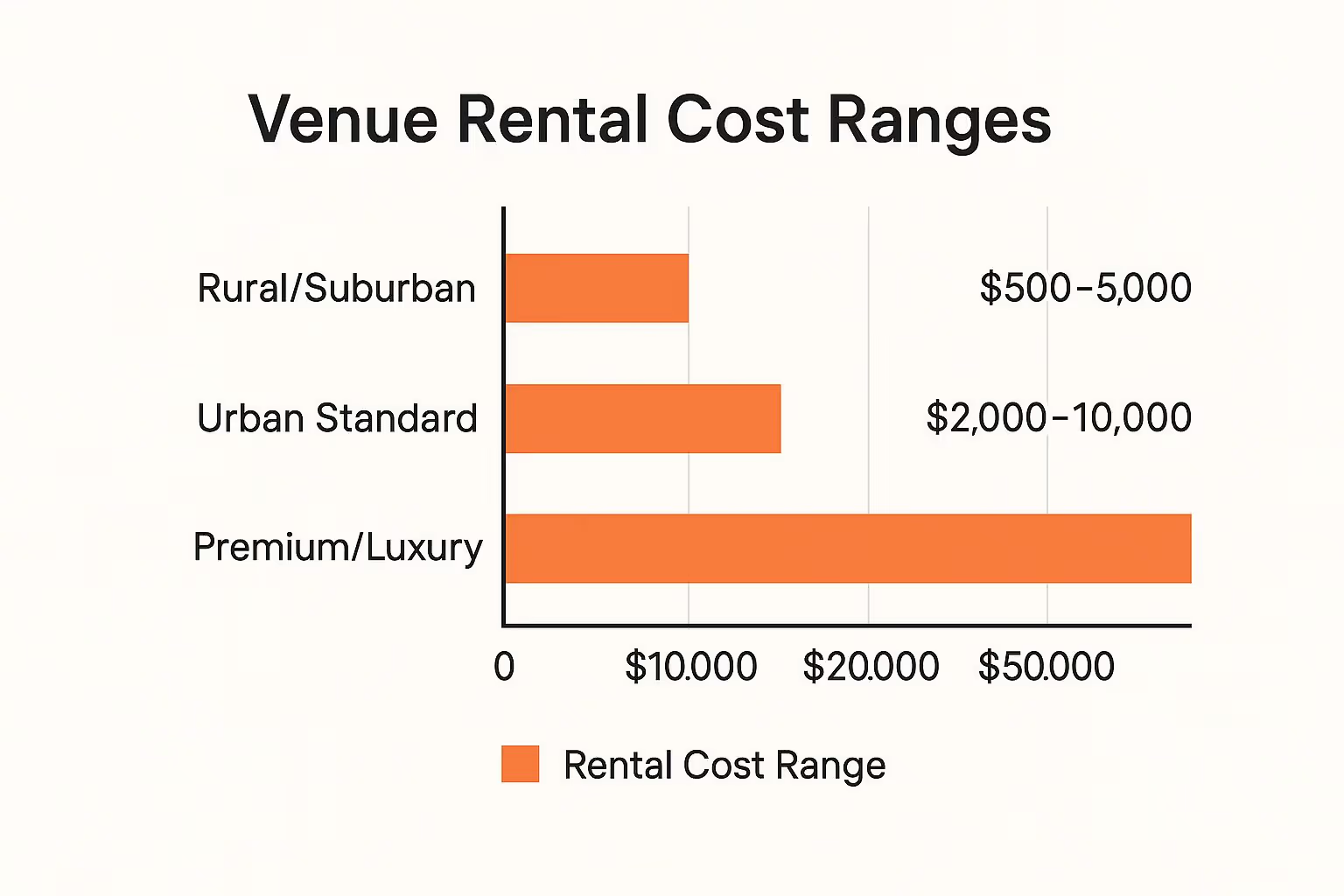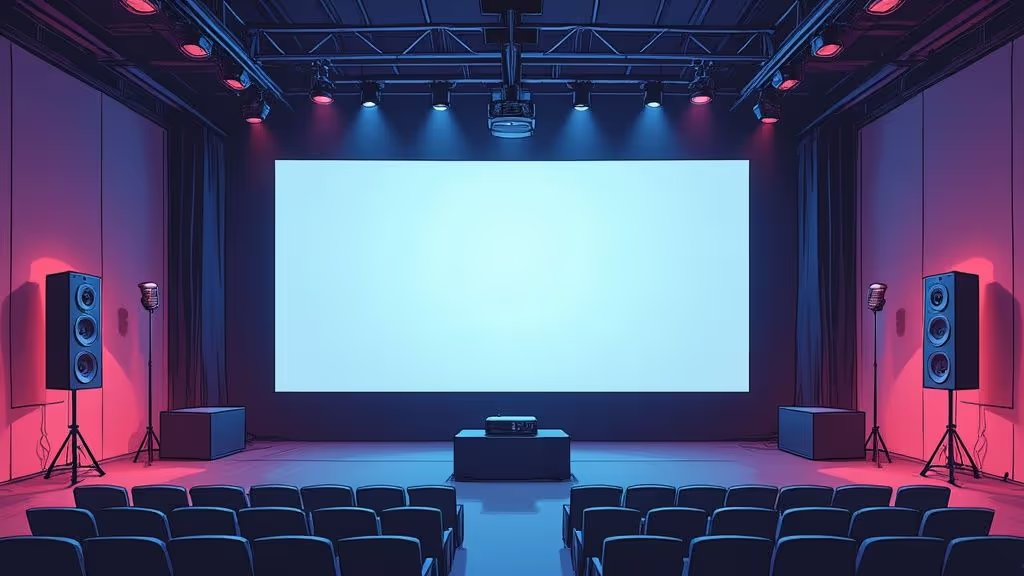Table of Contents
Unlocking the Secrets of Venue Pricing
How much does it cost to rent a venue for an event? This is a critical question for any successful event. This guide provides a clear breakdown of the key factors influencing venue pricing, enabling you to develop a realistic budget. We'll cover crucial cost drivers, from venue type and location to guest count and catering, equipping you to secure the best venue at the optimal price. Understanding these factors is essential for planning any corporate event, ensuring you maximize your budget and create a memorable experience. This list covers: venue type and location, rental duration, guest count and space requirements, food and beverage requirements, equipment and services, and insurance/liability needs.
1. Venue Type and Location
When determining how much it costs to rent a venue for an event, the type of venue and its location are arguably the most influential factors. Prestigious venues in prime locations—think bustling downtown areas, scenic waterfront properties, or exclusive neighborhoods—command significantly higher prices than venues in less central or desirable areas. Furthermore, the specific category of the venue itself, be it a hotel ballroom, a trendy restaurant, a sprawling conference center, a historic building, or a rustic outdoor space, plays a substantial role in determining the overall rental cost. For corporate brands and CMOs planning high-profile events, understanding this interplay is crucial for effective budget management.

The infographic above visualizes the average rental costs for various venue types across different locations. As the chart clearly demonstrates, major metropolitan areas like New York City and Chicago command considerably higher prices than smaller cities or rural locations. Furthermore, within a given location, the venue type itself introduces significant cost variations, with hotels and unique spaces like museums typically occupying the higher end of the spectrum.
This disparity in pricing stems from a combination of factors. Prime locations often offer unparalleled convenience and prestige, associating your brand with a sense of exclusivity and sophistication. Destination locations, particularly those known for their scenic beauty or cultural significance, can also attract higher attendance and generate greater buzz around your event. Exclusive venues further elevate the perceived value of your event, creating a memorable experience for attendees.
However, securing a venue in a prime location comes with its drawbacks. These sought-after spaces can easily double or even triple your venue budget compared to options in less central areas. High-demand venues often require booking far in advance, sometimes 9-12 months or more, to secure your preferred date. Additionally, many premium venues impose minimum spending commitments on food and beverages, which can further inflate your overall event costs.
Pros:
- Prestige and Convenience: Premium locations offer easy access for attendees and associate your brand with a high-end image.
- Elevated Perception: Exclusive venues create a memorable and impactful experience for guests.
- Attractive Destinations: Unique locations can draw a larger audience and generate excitement.
Cons:
- High Costs: Prime locations can significantly increase your venue expenses.
- Advance Booking: Popular venues often require booking well in advance.
- Minimum Spending: Many venues have minimum food and beverage requirements.
Examples:
- Luxury Hotel: The Plaza Hotel in New York City charges between $350 and $750 per person for events.
- Rustic Venue: A rural barn venue might charge a total rental fee of $2,000 to $5,000.
- Metropolitan Ballroom: Downtown Chicago hotel ballrooms average $10,000 to $15,000 for a Saturday evening event.
Tips for CMOs and Corporate Brands:
- Consider Off-Peak Days: Hosting your event on a weekday (Monday-Thursday) can often result in savings of 30-50% on venue rental fees.
- Explore Emerging Neighborhoods: Up-and-coming areas can offer unique and cost-effective venue options.
- Book in Advance: Secure your preferred venue and negotiate the best rates by booking 9-12 months ahead of your event date.
- Evaluate Suburban Venues: If most of your attendees will be driving, consider venues in suburban areas to reduce costs while still providing ample space and amenities.
This aspect of venue selection deserves its place at the top of the list because it forms the foundation of your event budget. Understanding the interplay between venue type, location, and cost allows you to make informed decisions that align with your brand's objectives and financial resources. By carefully considering these factors and implementing the tips provided, CMOs and corporate brands can effectively manage their event budgets while creating impactful and memorable experiences.
2. Rental Duration: A Key Factor in Venue Costs
When figuring out how much it costs to rent a venue for an event, rental duration plays a crucial role. The length of time you need the venue significantly impacts the overall expense. Understanding how venues structure their pricing models around time is essential for effective budgeting and avoiding unexpected costs. This is especially important for corporate brands and CMOs planning impactful events where sticking to a budget is critical.
Most venues offer a few different rental duration options: hourly rates, half-day packages, or full-day packages. Hourly rates provide flexibility for shorter events, while package deals can offer better value for longer events. However, premium time slots, such as evenings and weekends, often come with surcharges, increasing the overall cost. Furthermore, don't forget to factor in setup and teardown time. Many venues charge for this additional time, which can significantly impact your budget if not properly accounted for. Some venues even impose minimum rental durations, especially for prime time slots. Features to consider include: hourly rates vs. package pricing, premium timing surcharges, setup/teardown time charges, overtime fees, and minimum rental durations.
Pros:
- Precise timing control: Hourly rates allow you to book only the time you need, potentially minimizing costs for shorter events.
- Value with packages: Package deals can often provide cost savings compared to hourly rates for longer events.
- Inclusive setup: Some venues include setup time within the rental duration, simplifying budgeting.
Cons:
- Time constraints: Strict time limits can create a rushed atmosphere for your event.
- Expensive overages: Overtime charges can be steep, often 1.5 to 2 times the regular hourly rate, significantly impacting your budget.
- Additional time: Setup and teardown often require additional hours beyond the main event, adding to the overall rental duration and cost.
Tips for CMOs and Corporate Planners:
- Clarify setup/teardown: Explicitly confirm whether setup and teardown time is included in the quoted rental duration. This avoids billing surprises later on.
- Inquire about overtime: Ask about overtime rates before your event to understand the potential financial implications of running over schedule.
- Buffer your timing: Include a buffer period in your schedule to accommodate unexpected delays and avoid costly overtime charges. This is crucial for smoothly run corporate events.
- Consider off-peak times: Booking morning or afternoon slots can lead to significant savings compared to peak evening rates. Weekday events can often save 20-40% on venue costs.
- Negotiate: For large events or multi-day bookings, don't hesitate to negotiate the rental duration and associated costs with the venue.
By carefully considering rental duration and associated costs, corporate brands and CMOs can effectively manage their event budgets and ensure a successful and financially sound event. This element deserves its place on the list because it is a fundamental factor that significantly influences how much it costs to rent a venue for an event. Ignoring this aspect can lead to budget overruns and compromise the overall event experience.
3. Guest Count and Space Requirements
One of the most significant factors influencing how much it costs to rent a venue for an event is the anticipated number of attendees and the subsequent space requirements. This directly impacts venue pricing as larger groups necessitate more space, resources (like tables, chairs, linens), and staffing (servers, bartenders, security). Understanding how venues calculate costs based on guest count is crucial for effective budgeting and venue selection. This is a critical component when determining how much it costs to rent a venue for an event, making it an essential item on this list.
Most venues operate within minimum and maximum capacity limits and structure their pricing accordingly. Some common pricing models include:
- Per-person pricing: Venues charge a set fee per attendee, covering aspects like food, beverages, and basic services. This model makes scaling costs relatively straightforward, aligning expenses with actual attendance. Larger events may also qualify for per-person discounts.
- Tiered pricing based on attendance: Venues may offer different pricing tiers based on attendance ranges. For example, the cost per person might decrease as the guest count increases.
- Minimum guest guarantees: Some venues, especially for special events, require a minimum guest count payment regardless of the final number of attendees. This guarantees a certain revenue baseline for the venue.
- Food and beverage minimums: Often used in hotels and banquet halls, this model sets a minimum spending amount on food and beverages based on the expected guest count.
Examples:
- A venue might require a minimum 100-guest payment at $150/person, even if fewer than 100 guests attend.
- A conference center could charge a flat $5,000 fee for up to 200 attendees, with additional charges for exceeding that number.
- A hotel ballroom might impose a $10,000 food and beverage minimum based on the estimated guest count.
Pros:
- Scaling costs align with actual attendance (per-person model): You only pay for the guests who actually attend, except in cases with minimum guarantees.
- Larger events may qualify for per-person discounts: Economies of scale can work in your favor for high-attendance events.
- Multiple room options for different sized events: Venues often offer various spaces to accommodate events of different scales.
Cons:
- Minimum guest counts might require payment regardless of actual attendance: This can lead to sunk costs if your final attendance is lower than expected.
- Large groups limit venue options: Finding suitable venues can be challenging for very large events.
- Space modifications (dance floors, staging) often incur extra fees: Be sure to factor in these costs when budgeting.
Tips for Corporate Brands and CMOs:
- Get accurate attendance estimates before booking: Conduct thorough pre-event surveys and registration tracking to minimize discrepancies between estimated and actual attendance. This will help you accurately assess how much it costs to rent a venue for an event.
- Ask about price breaks at certain attendance thresholds: Negotiate favorable pricing based on projected attendance.
- Consider room layout efficiency when selecting venue size: Maximize space utilization to avoid overpaying for unnecessary square footage. Understand the difference between seated capacity vs. standing capacity.
- Request scaled pricing if attendance changes: Maintain open communication with the venue and explore renegotiating pricing if attendance projections change significantly. This is particularly important for events where final attendance numbers can fluctuate.
- Clearly outline space requirements beyond seating capacity: If you require a dance floor, stage, separate breakout rooms, or specific equipment areas, communicate these needs upfront to avoid unexpected charges. This detailed planning will allow for a more accurate estimation of how much it costs to rent a venue for an event.
By carefully considering guest count and space requirements, corporate brands and CMOs can effectively manage venue costs and ensure a successful event within budget. Don't underestimate the importance of this step when evaluating how much it costs to rent a venue for an event.
4. Food and Beverage Requirements
When calculating how much it costs to rent a venue for an event, food and beverage (F&B) requirements are a significant factor often overlooked until later in the planning process. This can lead to budget overruns and unpleasant surprises, especially since F&B costs often represent 30-50% of the total event budget. Understanding these stipulations upfront is crucial for accurate cost projections and successful event execution.
Many venues, particularly hotels, restaurants, and wineries, have mandatory F&B minimums or require the use of their in-house catering services. These requirements can take various forms:
- In-house catering requirements: Some venues exclusively permit their in-house catering team to handle all food and beverage services. This limits your vendor choices but can streamline planning in some cases.
- Food and beverage minimums: A minimum spend is a predetermined amount you must spend on F&B, regardless of your guest count. For example, a hotel might require a $10,000 F&B minimum for a Saturday event, even if your actual catering costs would be lower.
- Per-person package pricing: Some venues offer packages that include food and beverages at a set price per attendee. For instance, a winery might offer a $175/person package that includes a multi-course meal and wine pairings.
- Corkage and cake-cutting fees: Even if outside catering is permitted, venues often charge corkage fees for bringing your own alcohol and cake-cutting fees for serving a cake not purchased through them. These fees can add up quickly.
- Outside vendor fees: If you're allowed to bring in outside caterers, the venue might impose additional fees for their use of the kitchen facilities, equipment, or staff.
Pros of Venue-Specific F&B:
- Simplified planning: Using in-house catering can simplify logistics and communication, as you'll be working with a single point of contact for all F&B needs.
- F&B minimums may be negotiable: While minimums exist, they might be negotiable, particularly during off-peak seasons or for smaller events.
- Packages provide cost predictability: Per-person packages can offer predictable pricing, simplifying budget management.
Cons of Venue-Specific F&B:
- Limited menu flexibility: Using a required caterer often means less flexibility in menu customization and dietary accommodations.
- High markups on alcohol: Venues typically have significant markups on alcoholic beverages, often in the range of 300-400%.
- Mandatory service charges and gratuities: Be prepared for mandatory service charges and gratuities, usually between 18-25%, added to your F&B bill. For example, a restaurant with a $5,000 minimum plus 22% service charge and 8% tax will result in a final bill significantly higher than the initial minimum.
Tips for Navigating F&B Requirements:
- Negotiate F&B minimums: Don't hesitate to negotiate, especially during the off-season or for weekday events.
- Inquire about BYOB options and associated corkage fees: Explore the possibility of bringing your own beverages and understand any applicable corkage fees.
- Request detailed menu pricing early: Obtain detailed menu pricing and package options early in the planning process to accurately assess the total cost.
- Consider alternative event timings: Brunch or lunch events often have lower F&B minimums, potentially saving you 30-40% compared to dinner events.
- Clarify what counts toward minimums: Confirm which menu items contribute toward the minimum spend, as some venues exclude certain items like taxes and service charges.
F&B requirements are a critical component in determining the overall cost of renting a venue. Major hotel chains like Marriott and Hilton, as well as venue management companies like Kimpton and SMG, frequently utilize these practices. By understanding these requirements and employing the tips outlined above, corporate brands and chief marketing officers can effectively manage their event budgets and avoid unexpected costs when determining how much it costs to rent a venue for an event.
5. Equipment and Services
When calculating how much it costs to rent a venue for an event, equipment and service expenses play a significant role, often adding substantially to the base rental fee. These costs encompass a wide range of necessities, from audiovisual equipment like projectors, sound systems, and lighting, to furniture rentals including tables, chairs, and even lounge furniture for more relaxed settings. Don't forget about specialty items like dance floors, staging, and pipe and drape, which can transform a space. Finally, factor in staff costs for essential personnel such as security, coat check attendants, and parking attendants. Modern events may also require technology services like robust WiFi and streaming capabilities. Venues differ considerably in what they include in their base rental fee versus what constitutes an additional charge, making careful research crucial for accurate budgeting.

This aspect of venue rental deserves a prominent place on the list because it can significantly impact your overall event budget. Overlooking these costs can lead to unpleasant surprises and potentially derail your financial planning. For corporate brands and CMOs, understanding these costs is paramount for maximizing ROI on events.
Features and Benefits of Considering Equipment and Services:
- AV Equipment Rental: Ensures high-quality audio and visual presentations, vital for conferences, product launches, and corporate events.
- Furniture Needs: Provides comfortable and appropriate seating arrangements for attendees, contributing to a positive event experience.
- Specialty Items: Allows for customization of the venue to match your event's theme and create a specific atmosphere.
- Staff Costs: Ensures smooth event operation and attendee satisfaction by providing essential services like security and coat check.
- Technology Services: Enables seamless connectivity and streaming capabilities for modern events, facilitating presentations, live feeds, and audience engagement.
Pros:
- All-inclusive packages: Can simplify budgeting and provide a clear overview of expected costs.
- In-house equipment: Ensures compatibility with the venue's infrastructure and reduces technical difficulties.
- Professional staff: Venue staff are typically familiar with the space and can efficiently manage event logistics.
Cons:
- Captive pricing: Using in-house services can sometimes lead to higher prices due to limited competition.
- Limited flexibility: Venues may restrict the use of outside vendors, limiting your choices and potentially increasing costs.
- Hidden fees: Be wary of unexpected charges for seemingly basic necessities, which can inflate your budget.
Tips for Managing Equipment and Service Costs:
- Request an itemized list: Get a detailed breakdown of all included equipment and services to avoid surprises.
- BYO Equipment Discounts: Inquire about potential discounts for bringing your own equipment.
- Compare Vendor Costs: Explore pricing from external vendors to assess the competitiveness of in-house services.
- Negotiate Package Deals: Bundle multiple services to potentially secure a more favorable rate.
- Built-in Features: Prioritize venues with built-in features like AV equipment and furniture to minimize rental needs.
Companies like PSAV, a leading audiovisual provider in many hotels, and major rental companies like BBJ Linen and Event Rentals have popularized comprehensive event service packages. This underscores the importance of these services in creating successful events.
By carefully considering and planning for equipment and service needs, you can effectively manage your event budget and ensure a seamless and successful event. This is crucial for how much it costs to rent a venue for an event and achieving your event goals.
6. Insurance and Liability Requirements
When budgeting for an event, venue rental costs are a primary concern. However, a crucial factor that often gets overlooked and can significantly impact your overall expenses is insurance and liability. This aspect of venue rental is essential for protecting both you and the venue from potential financial burdens arising from unforeseen incidents. So, when considering how much it costs to rent a venue for an event, factor in these critical requirements.
Event venues typically require organizers to secure specific insurance coverage or participate in a liability protection program offered by the venue itself. These requirements are in place to protect both parties from a range of potential issues, including property damage, attendee injuries, alcohol-related incidents, and other liabilities that could occur during your event. Understanding these requirements is critical when calculating how much it costs to rent a venue for an event.
The specific insurance and liability stipulations vary significantly based on several factors:
- Event Type: A large-scale corporate conference with thousands of attendees will likely have higher insurance requirements than a small, private workshop.
- Attendance: The number of guests directly influences the potential risk and, therefore, the coverage amounts required.
- Alcohol Service: Serving alcohol at your event almost always necessitates additional liquor liability coverage, increasing the overall cost.
- Venue Policies: Each venue establishes its own specific insurance requirements, so careful review of their contracts is paramount.
Features of Insurance and Liability Requirements:
- Event Liability Insurance Requirements: Most venues mandate a general liability policy covering a specified amount, typically ranging from $1 million to $5 million or more.
- Damage Deposits and Security Deposits: These are often separate from insurance and are designed to cover potential damages to the venue itself.
- Alcohol Liability Coverage: If you plan to serve alcohol, dedicated liquor liability coverage is almost always mandatory.
- Vendor Insurance Requirements: Some venues require your vendors (caterers, photographers, etc.) to carry their own liability insurance.
- Cancellation Policies and Fees: Understanding the venue’s cancellation policy and associated fees is crucial, as insurance may not cover these costs.
Pros:
- Protection from Potentially Catastrophic Liability Costs: The right insurance safeguards your organization from potentially devastating financial repercussions in case of an incident.
- Some Venues Offer Coverage Options: This can streamline the process, although it's essential to compare their offerings with third-party options to ensure you're getting the best value.
- One-Day Event Policies are Relatively Affordable: For shorter events, securing the necessary coverage can be surprisingly cost-effective.
Cons:
- Additional Cost That's Often Overlooked in Budgeting: Insurance can be a significant expense, and failing to account for it can lead to budget overruns.
- Complex Requirements That Vary by Venue: Navigating the various requirements can be complex and time-consuming.
- Non-Refundable in Many Cases: Insurance premiums and some deposits are often non-refundable, even if the event is canceled.
Tips for Navigating Insurance and Liability Requirements:
- Check Existing Business Insurance: Your current business insurance policy might already provide some coverage. Review it carefully to understand its extent and any limitations.
- Compare Venue-Offered Insurance with Third-Party Options: Don't automatically opt for the venue's insurance. Shop around and compare quotes from third-party providers to ensure you're getting the most comprehensive coverage at the best price.
- Bundle Insurance Needs for Multiple Events: If you're planning multiple events, consider bundling your insurance needs to potentially secure lower premiums.
- Understand Which Vendors Need Their Own Insurance: Clarify with the venue which vendors are required to carry their own insurance and communicate this requirement clearly to your vendors.
- Negotiate Refundable vs. Non-Refundable Deposits: While not always possible, attempting to negotiate refundable deposits can help mitigate financial risk.
By understanding and proactively addressing insurance and liability requirements, chief marketing officers and corporate brands can avoid potentially costly surprises and ensure their events are fully protected. This crucial aspect of venue rental is an investment in peace of mind and should be a key consideration when determining how much it costs to rent a venue for an event.
6 Key Venue Rental Cost Factors Comparison
Capturing Your Event: Expert Video Production by Get Camera Crew
From sprawling conference halls to intimate meeting rooms, understanding how much it costs to rent a venue for an event involves juggling various factors. We've explored key cost drivers, including venue type and location, rental duration, guest count and space requirements, food and beverage needs, necessary equipment and services, and crucial insurance and liability requirements. Mastering these elements empowers you to create a realistic budget and secure the perfect space for a successful event, maximizing your return on investment. By carefully considering these aspects, you can confidently allocate resources and avoid unexpected expenses, ultimately contributing to a more impactful and memorable experience for your attendees.
For corporate brands and CMOs, a well-documented event is invaluable. It allows you to extend the reach of your message, amplify key takeaways, and showcase the impact of your event long after the last guest departs. How much does it cost to rent a venue for an event? It's a significant investment, so ensure its impact resonates. Capture the energy, the insights, and the connections forged at your event with professional video coverage. Contact Get Camera Crew today for a customized quote and elevate your next event with high-quality video production that showcases your brand’s vision and captures the essence of your gathering.






